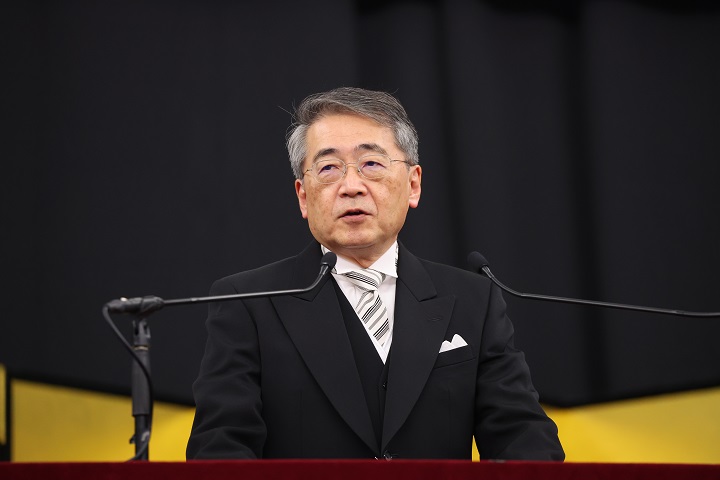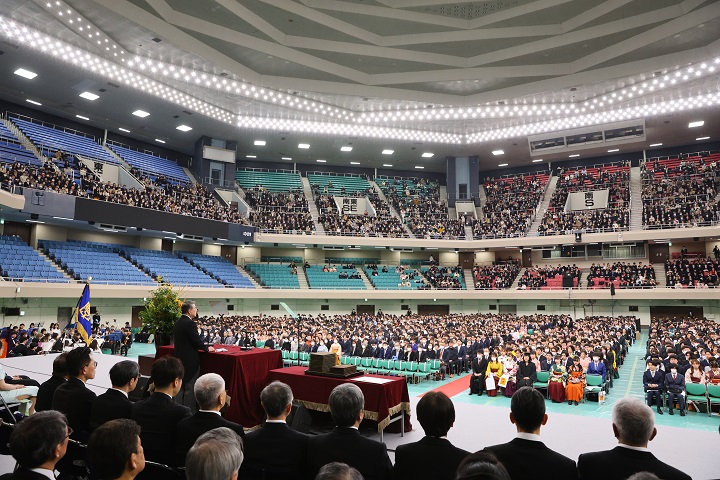News & Event
President’s Address at the Degree Conferment Ceremony, March 2024
To begin, I would like to congratulate our new graduates and degree recipients. I also extend my warmest congratulations to all family members joining us today.
Almost all of you graduating with Bachelor degrees today began your undergraduate studies in April 2020. At that time, due to the pandemic, we were unable to follow our usual tradition of holding an Entrance Ceremony in the Nippon Budokan. You had very few opportunities to attend the university campus and had to make preparations for the beginning of classes through communications from the university by e-mail and postal mail during April. Then, online classes started on a full scale in May, following the Golden Week holidays, with both students and faculty still unfamiliar with the new format. That was how university life began for those of you who are graduating today. You had few opportunities to make new friends and struggled to gain a tangible sense of your new status as students of Hosei University. Now that life has largely returned to its pre-pandemic form, maybe those things you experienced almost four years ago seem little more than part of the distant past. Or perhaps they remain deeply etched in your memories of student life: something you will never forget, even if you wish you could.
Back then, members of the university’s faculty and staff were plagued by concerns over whether the students who entered in 2020 would be able to make a successful transition to university student life, without losing valuable opportunities for learning. Today, as we prepare to celebrate your graduation, almost all our concerns have evaporated. Ever since those early days when students, faculty, and staff members alike were learning through trial and error, with little idea of what lay ahead, we have been impressed by your ability to adapt in various occasions. For example, even before the university was able to finalize an agreement with Zoom to remove time limits from online meetings, some students had devised a way to sustain online communication for long periods by transferring the meeting host designation from one participant to another. Likewise, when it came to presenting the outcomes of their learning, students developed effective presentations that capitalized on the online format with skillful use of image synthesis techniques. Some students even added a greater sense of realism to their reports with live content streamed from off-campus locations using smartphones.
Leveraging the online know-how they had thus acquired, students at the Tama Campus moved quickly to prepare for their 2020 Hosei Festival at Tama, which was held entirely in virtual format. Meanwhile, students at the Ichigaya and Koganei Campuses resolved to hold their editions of the Hosei Festival in face-to-face format at all costs, developing and adopting ICT tools to reduce on-campus crowding and systems to ensure visitor traceability in the event of infection. Innovations are generated where there is a need to be filled. Each individual innovation may have been small, and today may be taken for granted as part of our daily lives. But each and every one posed a challenge for those involved when it first came about. Taking an idea that you feel has potential and building it up into something you can call your own is a uniquely “individual” process of learning and realization, quite different from that of mastering something that already exists. This is surely something that you gained as a result of beginning your university student life at the outset of the pandemic.
We finally held your Entrance Ceremony at the Nippon Budokan a year later, just when you were entering second year. At this ceremony, which was attended by more than 60 percent of the new second-year students, I said: “In some cases, limitations themselves can be a source of interest and motivation, as you strive and seek ways to overcome them.” Subsequently, I observed students who entered the university in 2020 pursuing a number of initiatives that demonstrated their resolve to overcome limitations in practice. One of these, the Hosei Innovation Club, received the Grand Prize in the 2022 Practical Wisdom for Freedom Awards, and has further advanced and sustained its activities through to the present day. At the Community Exchange Day 2023 held last month at the Tama Campus, this year’s project leaders, including current first-year students, gave an inspiring report on their activities. Many of the other activities entered for the 2022 and 2023 Practical Wisdom for Freedom Awards arose in the same way from the experiences that students gained during the 2020 academic year.
In this way, the seeds sown by students entering in 2020 have firmly taken root on our campuses and are sure to blossom even more vigorously in the future. The dedicated efforts to defuse the difficult situations of all of you who entered in that first year of the pandemic have opened up a new page in our university’s history. I believe that your ingenuity and initiative to overcome the limitations that were forced upon you have now truly come to fruition. The concern I felt in early 2020 over whether or not you would be able to transition successfully to university student life is now replaced by a sense of pride at what you have achieved over the last four years, and profound joy at being able to celebrate your graduation here today.
One thing I have learned is that when people are placed in extraordinary circumstances such as those we all encountered four years ago, they act in ways that underscore individual differences even more than usual. Some people lose their sense of purpose when unable to engage in face-to-face communication with others or to pursue activities collaboratively. This type of person sought out all possible opportunities for face-to-face interaction, and endeavored to make maximal use of such opportunities, even in the initial phase of the pandemic. It is this type of person that sustained the activities of student clubs and teams for which face-to-face interaction is indispensable, despite the decline in members compared to previous years. I feel that this resulted in the formation of groups with a more select membership of individuals strongly committed to face-to-face activities.
Other people, however, reacted to the new restrictions on face-to-face activity as if it was their time to shine. Virtual activities are not an inferior version of their face-to-face counterparts: there are types of content and quality that can only be achieved in the virtual mode. Such people positioned themselves as the ones who would create new virtual activities that had never before been realized fully. What most people saw as “limitations” had actually generated an environment suited to these people’s aptitudes, and they embarked on new activities with great vigor. A new prominence was afforded to creative activities centered on virtual platforms, which had been inconspicuous on campuses where face-to-face activities were the norm. Seeing this change renewed my appreciation of how limitations can sometimes give rise to new forms of creativity.
Now is the time to reflect on your activities over the past four years, including the period when individual traits came to the fore in the way I have just described. I believe that such reflection will reveal to you, more than it would have you led an ordinary university student life, where your individual attributes and aptitudes truly lie. I want each of you to recognize the opportunities for self-awareness that you gained during your student life over the past extraordinary four years as precious experiences to hold in your heart as you embark on a new phase in your life. And regardless of what type of person you are, I hope that in the course of your student life you have formed connections with others who share the same characteristics as yourself, as well as with those who do not. Friends who have much in common can amplify their own strengths. Those who share little in common can complement one another and combine their strengths, finding opportunities to realize things that none of them could achieve on their own. Precisely because you began your lives at university in a year when simply meeting other people was a challenge, I hope you will continue to cherish the friends that you were able to make here regardless of the limitations you faced.
However, despite your remarkable success in finding ways to overcome limitations, I expect that there are also many things you dreamt of doing during your time as a university student but were unable to achieve over the last four years. It is my hope that you will not consign these to a list of things that you’ll never get a chance to do. If there’s something that sticks in your mind as a must-do item, surely an opportunity will arise somewhere, sometime in the future, for you to do it. Even a dream of experiencing life as a first-year university student in an ordinary campus environment is something fully realizable, and indeed required in today’s society, where the need for recurrent education is so strongly advocated.
Always keep in mind your list of “things I really want to do some time.” Believe in the attributes you affirmed within yourself through the experience of the pandemic, and the power of collaboration with people who are the same type as you, and with those who are different. And as you move on through life, add to your list of “things that I have done” one item at a time. As this list grows, you will also find that your list of “things I want to do” is enriched through your experiences. I am confident that having overcome so many challenges over the past four years, all of you are fully capable of achieving this.
Let me conclude these remarks by wishing you all a bright future ahead. Congratulations once again.



